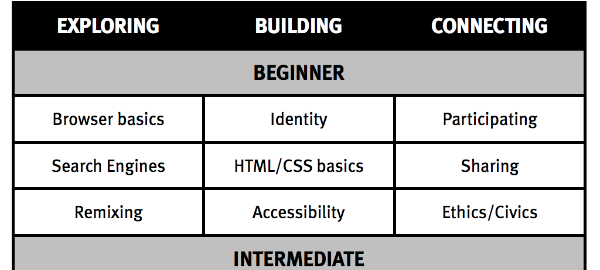Web Literacy Standard: a modest proposal (#weblitstd)

Update: For the latest information on the Web Literacy standard work, head to http://mzl.la/weblitstd
Over the last couple of months we at Mozilla have been hosting community calls in an attempt to come to a consensus around a new, open learning standard for Web Literacy. This is a contested area, for many of the reasons I point out in my yet-to-be-published paper on different types of ambiguity.
The reasons for us wanting to create a ‘standard’ for Web Literacy are outlined in this meta-post back in February. Since then we’ve had wide-ranging discussions, both on our weekly calls and on the Mozilla Webmaker list about what to include and, more recently, how to present the whole thing.
What I find fascinating is the importance of context when it comes to this work. This Web Literacy standard needs to to be flexible enough to apply to learners of all ages and stages and in contexts other than those with which we are most familiar. In short, it needs to be productively ambiguous. What do I mean by that? I mean it needs to be flexible enough to work in almost any context, yet be coherent enough to actually be worthwhile.
With that in mind, I want to present a ‘straw man’ which might serve us better than the previous grid:

Of course, the real fun comes when we get down to nailing down the competencies in each of the boxes. That’s this week’s call. 🙂
Do join us if you can for the weekly calls. The more eyes on this the better before we launch the draft version on April 26th!

Where would you place MathML and more generally scientific content (e.g visualizations, statistical plots)? I admit MathML isn’t really usable without Firefox or MathJax, but from an educational point of view, I think it’s important to communicate that scientific content is more than images, and math is now a first class citizen of the OWP — especially since it’s important for accessibility and re-usability of scientific content.
Hi Peter, thanks for the comment. 🙂
Given that MathML is a very specific use of the Web I’m not sure it would be included under a general literacy strand or competency. It is, however, a ‘skill’ that could map onto the grid in a particular context?
Well, math and science literacy is considered separate from regular literacy in the non-web world 🙂 Anyway, MathML could be under HTML/CSS if that means “markup in general”. HTML purists will of course argue it’s a separate XML standard, like SVG (where does that fit?).
For lack of official standards, science is probably a mix of Coding/Scripting and Designing for the Web with quasi-standards like d3.js. The same might hold for MathML since you really need MathJax to make it work cross-browser and open tools for authoring are still a problem (well, MathJax helps there too). Oh, and a disclaimer: I’m part of MathJax…
Doug, this looks good, but where is the infrastructure? I find it critical for the intermediate. Knowing where your webpage is hosted, how to set-up a simple server or create a *sql database, when to use a cloud service and when to set-up your own server. For a simple thing as building your website using WordPress; or set-up your RasberryPi as a media center, game console or music server, you need those skills.
Storytelling is important but I don’t see it at “building”. It may be at connecting as it is a set of: using tools + sharing + engage your audience.
Hi Alina, thanks for the comment!
‘Infrastructure’ was specifically mentioned in the previous version and there’s no reason why we can’t re-add it. I just thought it could be a pathway through some of these competencies (kind of a meta-level badge)?
Hi Doug! Yes, moving both Infrastructure and Identity on a meta level makes a lot of sense.
Where (if at all) do lightweight markup languages like markdown, Wiki-syntaxes etc come in? I find them invaluable both as an author as well as for introducing people to authoring for the web.
I think that’s a very good idea – this would probably come in at the ‘skills’ rather than the competency level. Thanks for the suggestion! 🙂